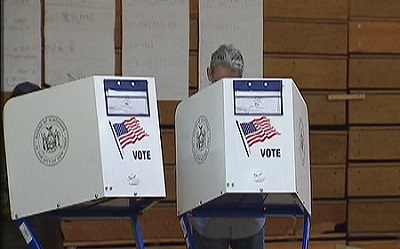Nine Charged in Large-Scale Voter Fraud Scheme on Skid Row

 Nine suspects are accused of election and voter fraud charges after allegedly paying homeless people in the Los Angeles, California Skid Row district. The homeless were given cash and packs of cigarettes to sign ballot measure petitions and voter registration forms, according to the Los Angeles County District Attorney’s Office in a press statement released on Tuesday.
Nine suspects are accused of election and voter fraud charges after allegedly paying homeless people in the Los Angeles, California Skid Row district. The homeless were given cash and packs of cigarettes to sign ballot measure petitions and voter registration forms, according to the Los Angeles County District Attorney’s Office in a press statement released on Tuesday.Prosecutors working for the D.A. charged nine people with about one-dozen felony counts for allegedly offering bribes to numerous homeless people in exchange for false and forged signatures on ballot petitions and voter registration forms
The main prosecutor — Deputy District Attorney Marian Thompson of the Public Integrity Division — noted that five of nine defendants are expected to be arraigned Tuesday morning in Los Angeles’ Foltz Criminal Justice Center.
While the Los Angeles news sources failed to mention the culprits’ political party, an L.A. police detective named simply “Tony” said it’s widely known the suspects are Democrats and are connected to leftist political organizations.
The charges include circulating a petition with false names; use of false names on a petition; voter fraud, registering fictitious voters. Also they were charged with fraudulently registering nonexistent people. Case BA472537 was filed for arrest warrant on Nov. 1.
The defendants are accused of engaging in the solicitation of hundreds of false and/or forged signatures on state ballot petitions and voter registration forms by allegedly offering homeless people $1 and/or cigarettes for their participation, prosecutors said. The alleged criminal acts were perpetrated during both the 2016 presidential election and the 2018 mid-term election cycles.
According to the press statement, charged in the criminal complaint are: Kirkland Kauzava Washington (dob 7/29/80); Harold Bennett (4/17/65); and Louis Thomas Wise (dob 8/4/82) who each face eight counts. The defendants face a maximum state prison sentence of six years and four months, if convicted as charged.
Also charged are Richard Howard (dob 1/12/56); Rose Makeda Sweeney (dob 12/11/75); Christopher Joseph Williams (dob 5/2/59); Jakara Fati Mardis (dob 5/17/83); Norman Hall (dob 11/1/57); and Nickey Demelvin Huntley (dob 9/2/74) who each face four counts. If convicted as charged, the defendants face a maximum sentence of four years and eight months in state prison.
Defendants Washington, Howard, Sweeney, Williams and Hall were arraigned today (Tuesday).
Prosecutors have recommended that bail be set at $25,000 for each defendant. The case remains under investigation by the Los Angeles Police Department and the FBI’s Los Angeles Field Office.
Election Crimes
 In democratic societies like the United States, the voting process is a means by which citizens hold their government accountable; conflicts are channeled into resolutions and power transfers peacefully. Our system of representative government works only when honest ballots are not diluted by fraudulent ballots. The FBI, through its Public Corruption Unit, has an important but limited role in ensuring fair and free elections. Election crimes become federal cases when:
In democratic societies like the United States, the voting process is a means by which citizens hold their government accountable; conflicts are channeled into resolutions and power transfers peacefully. Our system of representative government works only when honest ballots are not diluted by fraudulent ballots. The FBI, through its Public Corruption Unit, has an important but limited role in ensuring fair and free elections. Election crimes become federal cases when:
- The ballot includes one or more federal candidates;
- The crime involves an election official abusing his duties;
- The crime pertains to fraudulent voter registration;
- Voters are not U.S. citizens.
Federal election crimes fall into three broad categories—campaign finance crimes, voter/ballot fraud, and civil rights violations.
Campaign finance
- A person gives more than $4,600 to a federal candidate (various limits apply for donations to and from committees and groups);
- A donor asks a friend to give money to a federal candidate, promising to reimburse the friend; the friend makes the donation and the real donor reimburses him;
- A corporation gives corporate money to a federal candidate;
- A person who is neither a citizen nor a green card holder gives money to a federal, state, or local candidate.
Civil rights violations
- Someone threatens a voter with physical or economic harm unless the voter casts his ballot in a particular way;
- Someone tries to prevent qualified voters from getting to the polls in a federal election;
- A scheme exists to prevent minorities from voting.
Voter/ballot fraud
- A voter intentionally gives false information when registering to vote;
- A voter receives money or something of value in exchange for voting in a federal election or registering to vote;
- Someone votes more than once in a federal election;
- An election official corrupts his or her office to benefit a candidate or party (e.g., lets unqualified voters cast ballots).


